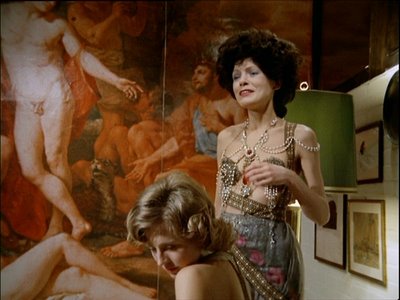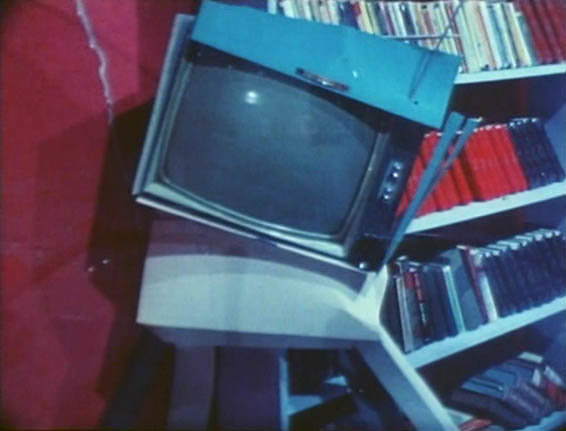This essay was commissioned by the Australian DVD label Madman, for their 2008 release of The Bitter Tears of Petra von Kant. In fact, I wrote essays about four separate Fassbinder films for them — the three others were Katzelmacher, Ali: Fear Eats the Soul, and Martha. —J.R.

“I love movies. Pictures about passion—and pain. Lovely!
[…] “Discipline’s okay as long as you’re having fun.”
–Karin (Hanna Schygulla) in The Bitter Tears of Petra Von Kant
An early watershed in Rainer Werner Fassbinder’s career as a filmmaker, The Bitter Tears of Petra von Kant (1972), his twelfth feature, might even be regarded as the first in which he explicitly “discovered” mise en scène. Adapting his own play —- which had premiered in Darmstadt half a year before, in June 1971, in a production directed by Peer Raben —- the film makes no effort to “open up” the original material in terms of its original setting, the flat of its title heroine, and it focuses on issues of camera placement and camera movement like few other Fassbinder films made before or since.
For Christian Braad Thomsen, who may be Fassbinder’s most authoritative critic, the film marks a significant turning point. Read more
I conducted two interviews with Michael Snow in the early 1980s. The first of these, commissioned by Film Comment‘s Richard Corliss (who sent me to Toronto in order to do it), was about Snow’s film Presents and ran in the magazine’s May-June 1981 issue. The second was commissioned by Simon Field’s excellent English magazine Afterimage. Both of these interviews were delightful experiences for me, and I feel privileged to have been treated by Snow during this period as a friend. (For a short while, I used to visit him once a year, whenever I came to the Toronto International Film Festival, and loved getting stoned with him — and then, most often, going to Chinatown for dinner.) —J.R.

The “Presents” of Michael Snow
A Breathless Intro
Lower Manhattan, 1981, the opening of a Canadian gallery, the onset of spring. Michael Snow’s photography/sculpture show at The 49th Parallel commences with Plus Tard (1977) – twenty-five lovely photographs, blurred and/or in focus, composing a critical/narrative tour of landscape paintings by the Group of Seven in Canada’s National Gallery. I speak to Snow for the first time since last June, when we met at a publication party for Regina Cornwell’s Snow Seen: The Films and Photographs of Michael Snow (PMA Books, $19.95); the second time since accidentally encountering him in Toronto in fall ‘78, when he invited me to attend one of his regular sessions with his free jazz group, CCMC; the third and fourth times since the Edinburgh Festival in late summer ’75 and ’76, when he premiered his last two films. Read more
The following is the 16th column I’ve written for Cahiers du Cinéma España, a bimonthly feature that I write for this magazine called “En movimiento,” translated into Spanish by Carlos Reviriego, the editor-in-chief; it appeared in their March 2010 issue (no. 32). — J.R.

The bound galleys of a new book by Jerry Roberts (a name unfamiliar to me), 480 pages long, has just arrived in the mail, and its title already made me uneasy before I even looked inside: The Complete History of American Film Criticism. Santa Monica Press announces a publication date of April 1, 2010. Even though this appears to be a serious and careful work within its own limits, there are reasons at the outset for both defining and challenging these limits.
At least three separate problems are raised by three of the seven words in the title — “the,” “complete,” and “American”:
(1) Why “the” and not “a”? To suggest something definitive at the outset is already to fib — in the same way that I believe that Nick James, the editor of Sight and Sound, fibbed, presumably without realizing it, in the Spring 2009 issue of Film Quarterly when he wrote, “The wonderful golden run of great international cinema in the 1990s that brought us the best of Edward Yang, Wong Kar-wai, Takeshi Kitano, and Abbas Kiarostami, among many others, petered out several years ago.” Read more



